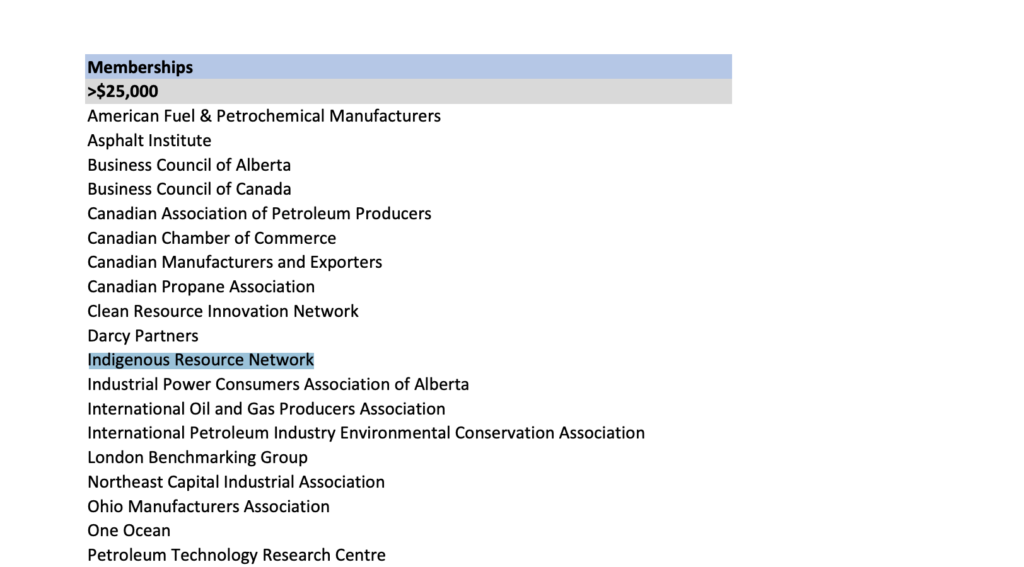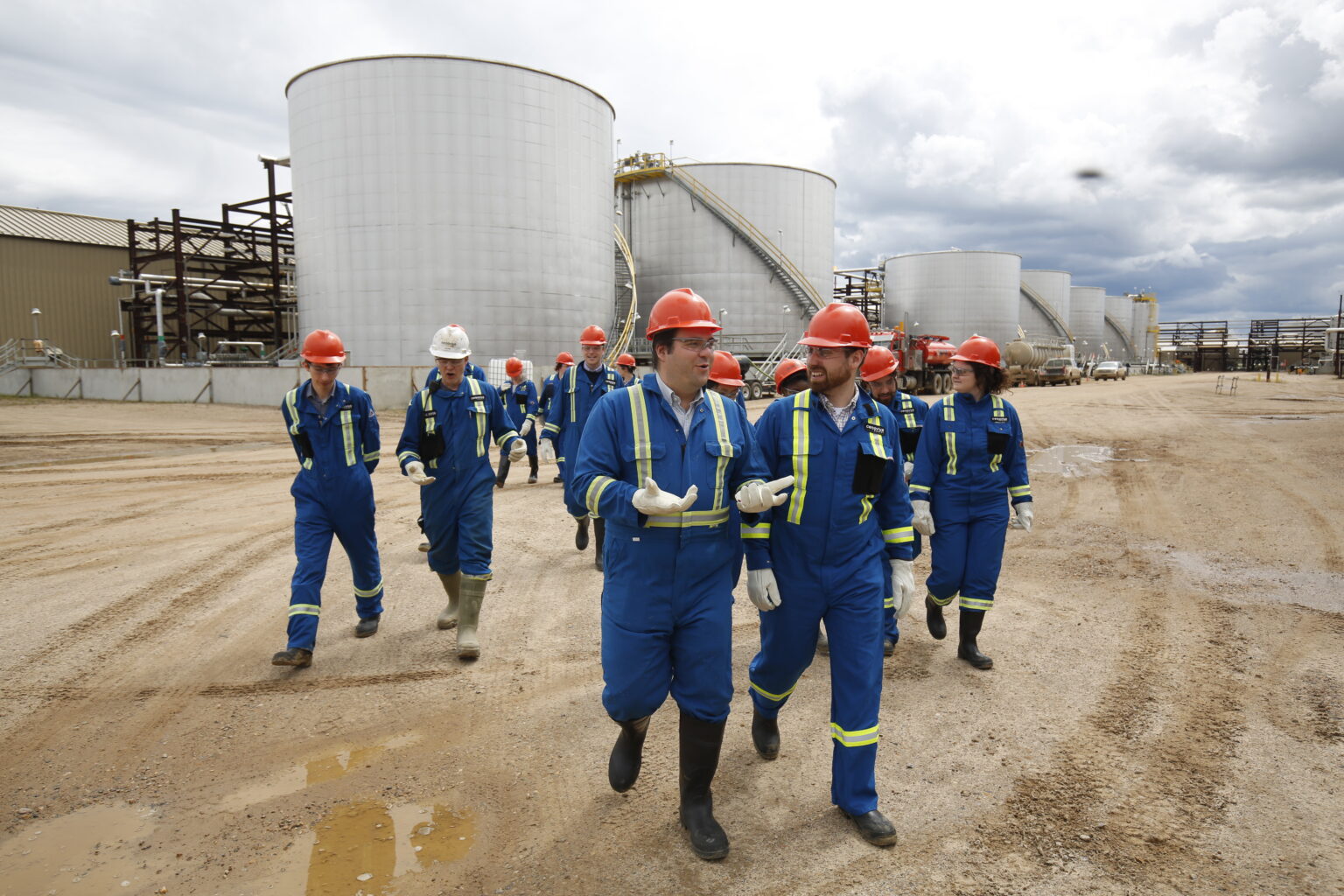A national Indigenous group is fighting a proposed federal limit on oil and gas sector emissions by arguing it will harm First Nations, Métis and Inuit communities.
But the group has a powerful non-Indigenous ally, according to corporate documents from Canada’s second-largest oil and gas producer.
Cenovus, a Calgary-based oil sands company that last year had net earnings of $6.5 billion, says in those documents that it has paid for membership with the Indigenous Resource Network (IRN). Yet a spokesperson for the network called that a “misrepresentation.”
The IRN is currently running a campaign called “Don’t cap Indigenous opportunity,” which is urging the federal government to scrap its plan to cut oil and gas emissions 46 percent from 2019 levels by putting an upper limit on allowable emissions from the sector. The regulations could be finalized by the end of the year.
Such a policy “will stop Indigenous oil and gas projects, capping our ability to pursue economic self-determination, create generational wealth and our ability to address the poverty in our communities,” the IRN claims.
“We share the IRN’s concern with any policy that limits economic opportunities for Indigenous peoples, and hinders their objectives for self-sustainability,” a Cenovus spokesperson told DeSmog in a statement.
Cenovus isn’t mentioned on IRN’s website, nor in the group’s media interviews or presentations to Canada’s federal government. But in a document on its website entitled “Cenovus advocacy membership and sponsorships, 2021,” the oil and gas producer lists the Indigenous Resource Network among memberships that have cost the company over $25,000.

“As noted in our disclosure, we have been a supporter of IRN since 2021,” the Cenovus spokesperson confirmed. “You will have to determine with IRN how they define membership and who else belongs to the organization.”
IRN spokesperson and board chair John Desjarlais downplayed Cenovus’ involvement. “Our membership we define as Indigenous workers and businesses,” he said. “Cenovus is not a member, they’re not any type of authority, decision-making, anything like that.”
The network said in a statement that it “is Indigenous governed and managed, independent, non-partisan advocacy organization giving a voice to Indigenous workers and Indigenous businesses involved in responsible resource development.”
Desjarlais confirmed that Cenovus has provided funding for the network, saying the support wasn’t specifically tied to the campaign against the oil and gas emissions cap. “We do have funding sources from a variety of places, different industries, as well as different businesses, Indigenous business community associations, so it’s pretty diverse in terms of where we get our funding from,” he said.
Cree climate activist and author Clayton Thomas-Müller said that the financial support from Cenovus suggests IRN isn’t just advocating for Indigenous communities. “They’re a propaganda machine on behalf of industry,” he claimed during an interview with DeSmog.
Tackling the oil and gas industry’s carbon footprint is a priority for the federal government, because it accounts for about one-quarter of all the greenhouse gases released in Canada.
But Cenovus and IRN have spoken out against the proposed federal emissions cap, which the Liberals first promised in 2021.
“I am very worried that if we remain on this path, it could lead to shutting in production at a time when the world is literally crying out for more oil and gas production,” Cenovus CEO Alex Pourbaix said last year during a conference call with investors.
Last September, the IRN reiterated that message in a submission about the policy to the House of Commons Standing Committee on Natural Resources. “There is widespread agreement that government’s proposed cap and cut in emissions cannot be done without a cap and cut in production,” the group wrote. “There is no way the proposed emission cap and cut can go forward without also reducing the economic opportunities to Indigenous workers, businesses and communities in the form of jobs, contracts, and own source revenues.”
Thomas-Müller disagrees that Indigenous prosperity is so dependent on industries which destabilize the climate.
“It’s really unfortunate that IRN misrepresents what I think is a really complex and nuanced issue,” he said. “Indigenous peoples deserve economic opportunity and a chance to level the economic playing field…but the type of development they’re pushing, it’s only going to push us further into ecological crisis.”
Organizations such as the International Energy Agency say that if we want to stabilize global temperature rise and avoid the worst consequences of a heated planet there must be “no new oil and gas fields approved for development.”
Yet in northwest British Columbia alone, TC Energy is building the Coastal GasLink pipeline, a Shell-led consortium called LNG Canada is constructing a liquefied natural gas terminal, and a partnership between the oil company Pembina and the Haisla First Nation is proposing another terminal project called Cedar LNG.
IRN executive director Robert Merasty didn’t mention the vast climate impacts of these projects in a Financial Post op-ed last fall. “We want a better future for our people and that is best achieved by engaging with industry on ownership opportunities,” he wrote.
“They’re repeating the talking points of industry,” Thomas-Müller said. “I significantly question if these people actually do care about the future of Indigenous economies in Canada with the archaic expansion of industry that they’re supporting.”
Subscribe to our newsletter
Stay up to date with DeSmog news and alerts






